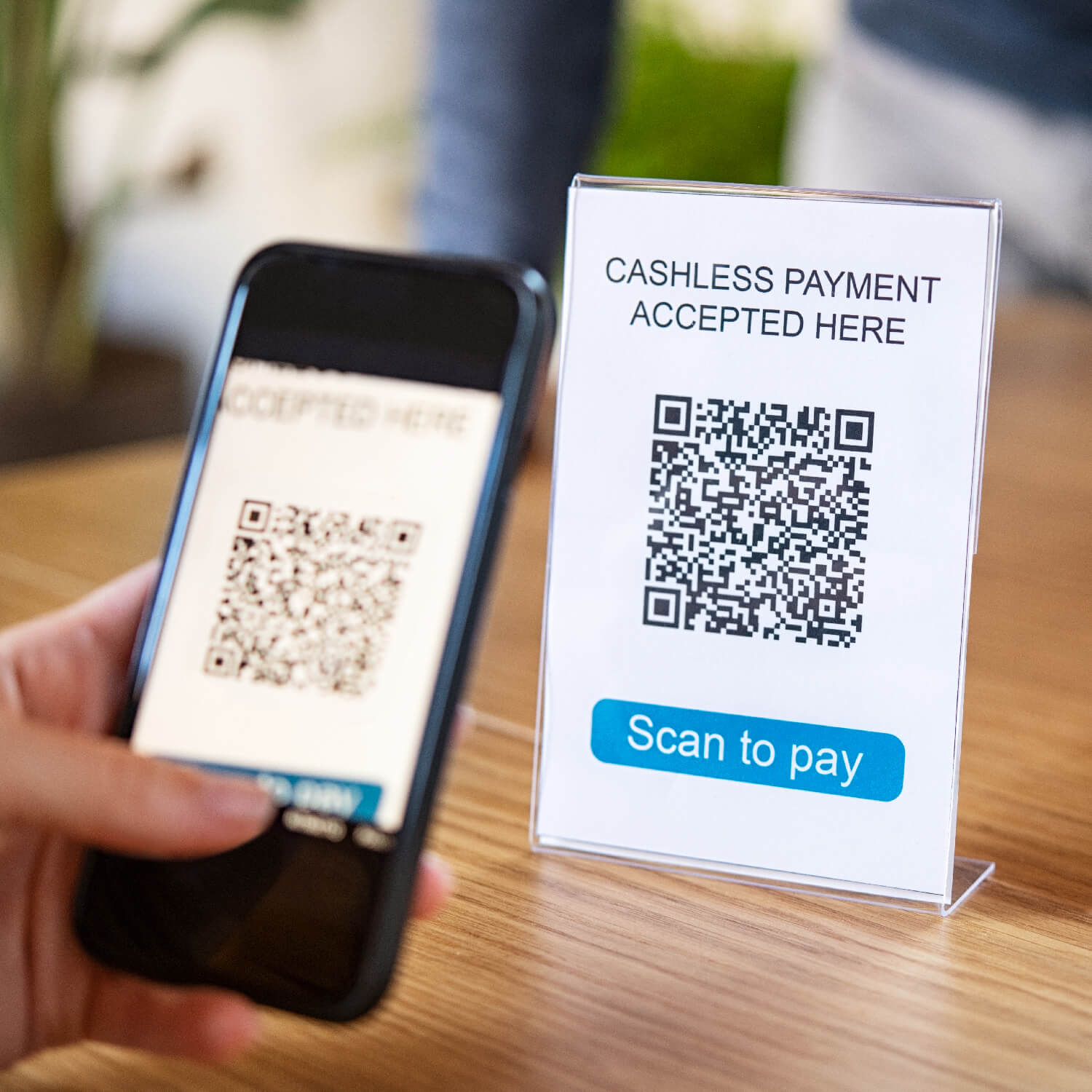A QR code is a machine-readable code consisting of an array of black and white squares, typically used for storing URLs or other information for reading by the camera on a smartphone. To generate a QR code for your business, you can use a free online QR code generator such as QRLink.
In today’s digital world, QR codes are an essential part of any business marketing strategy. QR codes are a quick and easy way to share information about your business with potential customers. But how do you create a QR code for your business?
Creating a QR code is actually quite simple. There are many free online tools that allow you to generate a QR code for your business in just a few minutes. Once you have created your QR code, you can then add it to your website, social media pages, or even print it on marketing materials such as flyers or business cards.
When potential customers scan your QR code, they will be taken to a landing page where they can learn more about your business. This is a great way to increase leads and conversions for your business. So if you’re not already using QR codes as part of your marketing strategy, now is the time to start!
Qr Code Generator
A QR code generator is a tool that helps you create QR codes for your business or personal use. There are many online and offline tools available to generate QR codes. Some of them are free while some are paid.
The main advantage of using a QR code generator is that you can create customised QR codes with logo, colours and design of your choice.
There are various uses of QR codes. You can use them to promote your business or website, share contact information or even share a message with someone.
A single QR code can be used for multiple purposes. For example, you can use the same QR code to share your website URL on social media platforms like Facebook and Twitter as well as on print media like flyers and brochures. This will help you save time and money in terms of printing and distribution costs.
When creating a QR code, make sure that the size is large enough so that it can be scanned easily from close range as well as from afar. It is also important to choose a colour combination that contrasts well against the background so that the code can be easily read by scanners. You should also avoid using too much text inside the code as it may make it difficult to scan accurately.
Qr Code for Business Card
A QR code is a two-dimensional barcode that can be read by smartphones and other devices with a camera. This type of barcode can store up to 4,296 alphanumeric characters, which is more than enough information for a business card. You can generate a QR code for your business card using a free online QR code generator like Kaywa or QRCode Monkey.
Simply enter your contact information into the fields provided and download the QR code image. Then, print the QR code on your business cards using any standard printer.
When scanning the QR code with their smartphone, potential customers will be taken to your website or social media page where they can learn more about your products or services.
Including a QR code on your business card is an easy way to make it more interactive and informative. Plus, it’s a great way to stand out from the competition!
How to Create a Qr Code for a Document
A QR code is a type of two-dimensional barcode that can be read by smartphones and other devices with cameras. You can create a QR code for any document that you have saved as a PDF. Here’s how:
1. Go to the website qrcode-generator.com.
2. Select “URL” as the type of data you want to encode in the QR code.
3. Enter the URL of the PDF document that you want to create a QR code for.
For example, if your PDF is stored on Google Drive, you would enter the following URL: https://drive.google.com/open?id=0Bz9_hmGJH5CgZjNkYjc4MzQ2LUE
Best Qr Code Business Card
A QR code business card is a physical card that contains a QR code which can be scanned by a smartphone. The code leads to a digital version of the card, containing all of the same information as the physical one. This makes it much easier for potential customers to save and store your contact information, without having to type it out or take a picture of the card.
QR codes are becoming increasingly popular, as more people own smartphones and are using them for everything from online shopping to finding local businesses. A QR code business card is an easy way to make sure that your contact information is available to anyone who needs it, without taking up valuable space in their wallet or purse.
There are many ways to design a QR code business card, but there are a few things that should be included:
-Your logo or company name: This will help people remember who you are and what you do.
-Your contact information: Make sure to include your website, email address, and phone number so people can easily get in touch with you.
-A call to action: Include a call to action such as “Scan me for more info!” or “Visit our website for more products!” to encourage people to scan your QR code.
If you’re looking for a creative way to stand out from the competition, a QR code business card is definitely worth considering!
Free Qr Code Generator
A QR code is a two dimensional barcode that can be read by smartphones and other devices with cameras. A QR code generator is a software that allows you to create your own QR codes. There are many free QR code generators online that allow you to create codes for free.
All you need to do is choose the type of content you want to encode, enter the data, and then click generate. The generated code can be downloaded as an image or vector file.
Free Qr Code for Business
As a business owner, you’re always looking for ways to save money and get ahead of your competition. One way you can do this is by using free QR codes for your business.
QR codes are a great way to promote your business and make it easy for customers to find your products or services.
You can use them on your website, in social media posts, or even on physical products like flyers or business cards.
There are many free QR code generators online that will allow you to create codes for free. All you need is a logo or image, and the generator will create a code that can be scanned with a smartphone camera.
Once your code is generated, you can use it anywhere you want to promote your business. Place it on your website so visitors can scan it and be taken directly to your product page. Or put it on flyers and business cards so people can scan it and get more information about what you have to offer.
QR codes are an easy and affordable way to promote your business. So take advantage of the resources available online and start generating codes today!
Google Form Qr Code Generator
If you’ve ever wanted to create a QR code for a Google Form, you’re in luck! There’s now a free online QR code generator that makes it easy to create QR codes for your forms.
To use the generator, simply go to the website and enter the URL of your form.
You can then choose how you want the QR code to look, and whether you want it to be static or dynamic. Once you’ve generated your code, you can download it as an image or print it out.
If you’re not familiar with QR codes, they’re basically like barcodes that can be scanned by smartphones.
When someone scans your QR code, they’ll be taken directly to your form so they can fill it out. This is a great way to make sure people can easily find and fill out your form, especially if you’re sharing it offline.
So if you need a quick and easy way to generate a QR code for your Google Form, head on over to the QR Code Generator website and give it a try!
Qr Code Business Card Iphone
If you’ve ever been to a trade show or networking event, you’ve probably seen QR codes on business cards. A QR code is a quick way to share your contact information with someone by scanning the code with your smartphone. If you have an iPhone, there are several ways to scan QR codes.
Here’s how to do it:
First, open the Camera app and point it at the QR code. The iPhone will automatically detect the code and display a notification.
Tap on the notification to open the contact information in the Contacts app.
You can also use a third-party QR code reader app. There are many of these apps available for free in the App Store.
Once you’ve installed one of these apps, open it and point your camera at the QR code. The app will scan the code and display the contact information. Some of these apps also allow you to save the contact information so you can access it later even if you don’t have your phone with you.
QR codes are a great way to quickly exchange contact information without having to type everything out manually. If you have an iPhone, make sure to take advantage of this handy feature!

Credit: pixlgraphx.com
Are Qr Codes Free for Business?
Yes, QR codes are free for businesses. You can create and download your own QR code from sites like QRCode-Generator.com and PrintQRcodes.net. These codes can be printed on marketing materials like business cards, flyers, and posters to provide customers with a quick and easy way to find your website or online store.
How Do I Get a Qr Code for My Business Website?
If you’re looking to get a QR code for your business website, there are a few things you’ll need to do. First, you’ll need to create a QR code using a QR code generator. There are many free online QR code generators available, so finding one should be easy.
Once you’ve generated your QR code, you’ll need to add it to your website. This can be done by adding the HTML code for the QR code to your website’s source code, or by using an image of the QR code and linking it to your website’s URL. Either way, make sure that the QR code is visible on your website and that it links correctly to your URL.
Once you’ve added the QR code to your website, promote it! Let people know that they can scan the QR code with their smartphone and be taken directly to your website. You can promote your QR code through social media, print ads, flyers, or any other marketing channels you use.
Make sure people know what they’re supposed to do with the QR code – scanning it should take them directly to your site where they can learn more about what you have to offer.
How Do I Get a Qr Code for My Shop?
There are a few ways that you can go about getting a QR code for your shop. One way is to create the code yourself using a QR code generator. Another way is to find someone who specializes in creating QR codes and have them create one for you.
Whichever route you decide to go, make sure that you get a high-quality QR code so that customers can easily scan it and be taken to your shop’s website or online store.
How Much Does a Qr Code System Cost?
If you’re looking to get started with QR codes, you might be wondering how much a QR code system costs. The truth is, the cost of a QR code system can vary depending on your needs. For example, if you just want to create a few simple QR codes for use on your website or in printed materials, you can find free online tools that will allow you to do this.
On the other hand, if you need more advanced features like tracking and analytics or custom design options, you’ll likely need to sign up for a paid service.
Generally speaking, paid QR code services start at around $10 per month, but prices can go up from there depending on the features and customization options you require. So, if you’re trying to budget for your QR code project, it’s important to think about what level of service you need in order to get the results you’re after.
How to Create a QR Code for FREE | QR Code for Business (Beginners Guide)
Conclusion
If you’re looking to get a QR code for your business, there are a few things you’ll need to do. First, you’ll need to decide what information you want your QR code to contain. This could be your website URL, your email address, or even just a short message.
Once you’ve decided on the data you want to include, you can use a free online QR code generator to create your code. Once it’s generated, you can download it and print it out to use in marketing materials or on your website.



